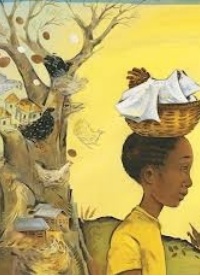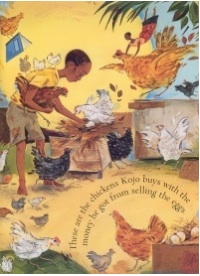a real-life story about the value of work and philanthropy
/ONE HEN
by Katie Smith Milway, illustrated by Eugenie Fernandes - Bloomsbury Publishing, 2009
ages 4 to 12 years / diversity, s.o.s.e.
When Max was eight, we had a conversation that went something like this:
Max: So Mum what is the solution to the people in Africa who only have one bag of grain a month to eat. (We'd been reading Hungry Planet.)
Kim (bamboozled actually): Well it's very complex. One of the problems is that there are bad governments in some parts of Africa who won't let food get to the people, and another problem is that many parts of Africa don't get rain to grow crops. ……
Kim (noticing Max wiping his eyes): Are you ok?
Max (now sobbing loudly with tears running down his cheeks): Yes, but I really want to fix it.
Kim: consoling words of some description…….
Max: I think our family should spend $50 a week on food. Like we could skip Family Home Evening treat or only have chicken and broccoli (Max's favourite) every two weeks and save the money.
A discussion about micro financing and humanitarian aid funds follows.
Max: OK so I'll bring it up in family meeting (which he did).
Luckily I came across this book shortly after that.
One Hen is the story of a young boy who receives a tiny loan to buy just one chicken.
He has to walk for two hours to the chicken farm to buy this first chicken.
(A two-to-four hour return family walk is a good way to make this a bit real—after all, many western children will never have walked for two hours straight, especially not for a purpose other than simply a hike.)
The boy pays back his first loan (from his mother who in turn had borrowed from her community) and eventually manages to build up his flock until he has the largest chicken farm in West Africa.
And along the way, the young boy grows into a man with a family that he supports through his chicken farm.
Of course, he needs additional funds as his business grows, so he takes out more small loans. And, because he recognises the importance of that first community loan, he is careful to lend money to others who need a very small loan to start a very small business.
It's nice that the story is based on the real-life experiences of Kwabena Darko and a short biography of him is included in the back of the book. Also at the back of the book is a brief explanation of micro-financing and some suggestions for organisations that do micro-lending.
This is a great book to start addressing world poverty, the importance of contributing, and to introduce the idea of micro-financing.
It's helpful in teaching the value of work, the importance of families, the benefits of community and to give some perspective on owning ‘stuff’. So it’s good to read when those issues are arising.
It's also good to read when children are feeling powerless which may evidence as angriness, bullying, being uncooperative, lack of care for personal possessions and so on.
A small reading hint:
There are quite a few words in the book—they’re needed to tell the story—so a small child might struggle to get through the whole thing in one reading. But the illustrations are eye-catching and cheerful, so they help to hold attention.
Some other things you might enjoy doing with this book: starting your own chicken farm with just one chicken (maybe even making a micro-loan to your child to buy the chicken then buying the eggs so it can be paid back), learning about African food and plants (such as the cassava plant, and how to cook it over an open fire) and reading Hungry Planet (which may raise some curly questions).
Amazon - Book Depository - Booktopia










